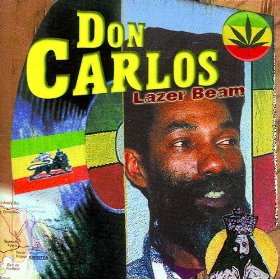An Afternoon with an Icon: Inity Weekly Shoots the Breeze with Don Carlos
“Hello.” “Good afternoon.” “Good day.” These are salutations that average people use when they have ordinary conversations. However, the person on the other end of this call is far from average and this conversation is far from ordinary—at least for Inity Weekly it is. “Yes, youth. Bless up…” was the greeting Don Carlos (born Euvin Spencer) used when he answered our call on a windy afternoon before a stellar performance in Denver, Colorado.
For those who may not know, Don Carlos has been a staple in reggae music since the early 1970’s. He hails from the Waterhouse section of Kingston, Jamaica and began his singing career as an original member of the roots vocal group, Black Uhuru (Swahili for “freedom”). Don Carlos then began his solo career where he composed a catalogue of music that laid the foundation for his status as a reggae icon. Although we had a laundry list of questions to ask, our time to talk was limited. Luckily, Don Carlos’s energy was so organic that we managed to turn the interview into a fluid, fan-artist conversation, getting all questions answered with an added dose of some Don Carlos wisdom and “overstanding.”
Inity Weekly (“IW”): Before we start today, Don Carlos, I have to tell you that Inity Weekly is one of your biggest fans. In fact, my father has been a huge fan of yours since he was a teenager.
Don Carlos (“D.C.”): (laughs) Yea, mon. Bless, bless. It’s all about spreading a positive message through the music, you know?
IW: Definitely. Tell us a little but about your childhood and early influences.
D.C.: Well, I am originally from Waterhouse, Kingston in Jamaica. It was a rough place to grow up. There was a lot of negative things going on around me as a youth—mainly violence. Even though I was surrounded by violence and poverty, I never let it affect me. It also helped that I was beloved in the community. I never really got mixed up in [all the violence and negativity going on around me].
IW: How did your environment influence your decision to become a musician?
D.C.: Because there was so much violence going on around me, music became my escape. Music was like my motivation to embrace happiness. It’s like the music made my troubles go away. And when I kept the music positive, it gave me encouragement and joy.
IW: Was it difficult to get your solo career off the ground?
D.C.: No, it wasn’t too difficult. In the 1960’s, I hung around a lot of artists. [One of the luxuries of growing up where I did was that you were constantly surrounded by talented, popular musicians]. So, when it came time for me to branch out on my own, I had already created a network of reggae artists that were [in my corner]. Matter of fact, one of my closest “brethren” when I started out was Errol Dunkley.
IW: Were the artists you hung around very helpful? Did they provide a lot of insight, etc.?
D.C.: Yeah, most of them were. But, there were times when they weren’t so helpful. For example, I remember bringing a song to Delroy Wilson because I wanted his feedback on it. Delroy told me he liked the song and we ended up recording the song with us and another artist on it; but when the song came out, my parts were taken off of it. So, basically, they had taken the song from me. I admit I was upset about it but it taught me a valuable lesson.
IW: After that were you more cautious about letting people hear your music before it was officially recorded or released?
D.C.: Yeah, mon. It took me a long time for me to “come back to myself” after that and there were few people that I really trusted. One of those people I really trusted was Gregory Isaacs. After all that happened, Gregory sort of took me under his wing, gave me guidance, and showed me how to sell my music.
The icon went on to discuss the growth that came from having established artists take advantage of his talent. In contrast, he also explained how artists, such as Gregory Isaacs and Sugar Minott, were great mentors. “Having those guys’ support,” Don Carlos explained, “really help me refine my talent.” As Don Carlos discussed the creative process behind some of his biggest singles like “Laser Beam,” “Young Girl,” and “I’m Not Crazy,” we began examining music’s impact on world issues and on its impact on listeners.
IW: What kinds of music do you listen to, besides reggae?
D.C.: There’s no “kind of music” in particular that I listen to; as long as the music has a positive message. That’s what it’s all about—positive vibes. I listen to what goes on in some music today and it’s disappointing. There are a lot of X-rated lyrics being put out there now. The kind of lyrics that don’t really teach the youths anything positive. Music is supposed to be uplifting, not degrading and thoughtless. It’s, at the very least, supposed to make the people calmer… more focused toward righteousness. So, we can’t mislead the youth with lyrics that don’t have any positive social value. It’s hard for the world to become a better place if we don’t have positive music sending the message on a global level.
IW: Deep. Where are some of your favorite places to perform? With what artists do you enjoy working?
D.C.: I love to perform anywhere the people respond well to the positive vibrations. California always has good vibes, because there’re lots of roots people there who are conscious, humanitarian, and down to Earth. But one of my favorite performances was in Nairobi, Kenya where I had an audience of about 129,000 people. That crowd was great. They rocked with me from beginning to end and knew nearly all of my songs. I had so much fun doing that show.
As far as artists I work with, I’m doing some work now with a young artist, Jimmy D. I’ve recently done some tracks with Rebelution, Slightly Stoopid, and guys like that. I’m working on an album now and hopefully the songs I did with those bands make the album.
IW: Well, Don Carlos it was a pleasure speaking with you today. We really appreciate all the work you have done. Is there anything you would like to say to your fans out there?
D.C.: Yeah, mon. Yeah, mon. Bless every time. I just want to let them know to keep a positive vibe and “don’t try to please man… you should be focused on trying to please only your creator.” And I also want to thank you all, Inity included, for taking a positive route and bringing the positive music culture to the masses. (ed. This is NOT shameless plug, I promise.Don Carlos actually gave us a shout out, and we’re grateful for it.)
We fans sometimes wonder how our favorite artists consistently produce quality work decade after decade. Speaking with Don Carlos makes it all clear, however, that the formula for timeless success is simple. First, you have to love your art form. Second, you must work tirelessly to perfect your ability to convey your art to the global community. Most importantly, during this process, you must remain true to your vision and message. Don Carlos undoubtedly loves reggae music. He has worked for nearly four decades on perfecting his craft, while developing a following that spans across all ages and cultures. However, in our opinion, Don Carlos’s organic demeanor and roots mentality is what has kept him relevant for the past thirty five (plus) years.
For more Don Carlos music, check out the iTunes store or visit http://www.doncarlosreggae.com.
Special thanks to Mary Anne Rubin and the legend himself, Don Carlos...
Photos: Christy Jeziorski for Inity Weekly



